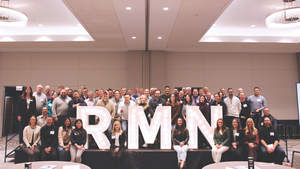PROGRESS IN B2B NOT AS FAST AS THE HYPE: REPORT
PASADENA, Calif. -- Retailers and wholesalers are taking a measured approach to the development of business-to-business Internet commerce, in spite of the breathless hype accompanying the new technology, according to research presented at the SN/Executive Technology Summit on Internet commerce here last week.Douglas Rossiter, president, the Advantage Group/U.S. Markets, Worthington, Ohio, said, "With
April 2, 2001
DAN ALAIMO
PASADENA, Calif. -- Retailers and wholesalers are taking a measured approach to the development of business-to-business Internet commerce, in spite of the breathless hype accompanying the new technology, according to research presented at the SN/Executive Technology Summit on Internet commerce here last week.
Douglas Rossiter, president, the Advantage Group/U.S. Markets, Worthington, Ohio, said, "With all the hype and all the energy of last year -- just in the number of press releases alone -- you would have thought this was clearly a revolution. But the answer came back, 'No, it is really much more moderate than that.' "
About three-quarters of the retailer and wholesaler respondents said the pace of progress in this area has been deliberate, using terms like "controlled energy" and "cautious optimism" to describe their approach, and this is by design, Rossiter said. One respondent said, "We have invested heavily in technology before. It kept us in business, but our net profit picture is no better. Is B2B different?"
The Advantage Group report on B2B, "Coming of Age: Are We Ready?" is based on responses from 54 executives from large companies, 21 of whom are chief information officers in retailer/wholesaler organizations, and 33 of whom are from the manufacturing community. Responses from 15 others affiliated with the industry, largely from the technology vendor area, are also reflected in the report.
"Technology drove the initial high level of interest, but now comes the hard part: making it work for us," Rossiter said. Some retailers and wholesalers are concerned about return on investment, and recently manufacturers have become more cautious about spending on new technology.
The survey found companies that are still in the early planning phase more cautious, while those farther along tend to have more aggressive expectations about the future pace of development. Also, there are differences between what top management sees and what is actually going on in the field, Rossiter noted.
"Retailer and wholesaler CIOs see in their organizations much more movement toward use and deployment of systems, whereas those on the line, asked if they were using it in their everyday jobs, said, 'No, we are still in the planning phase,"' he said.
Collaborative applications are seen to be a high priority among retailers, wholesalers and manufacturers, Rossiter noted. However, when they were asked what they are focusing on now in terms of development, collaborative planning fell to the bottom of the list.
Other applications, many of which are needed for collaboration, were deemed more important. Among these: item catalog, new item introduction, item management, category management, order management, promotion management and invoicing. These responses led the report to question how and when collaboration might become a reality.
The retailers and wholesalers viewed merchandising and reduced product cost as the most important benefits of B2B, while manufacturers were more focused on order processing and personnel productivity -- taking people out of the field and replacing them with Internet applications. "No one, interestingly, expects competitive advantage to be a benefit," Rossiter said.
Among the barriers to progress cited in the survey, the inability to prove the business case and a lack of trading-partner commitment both ranked at the top, followed by market uncertainties, systems inflexibility, internal technology limitations, changing technologies, industry standards, security issues and organizational change.
About the Author
You May Also Like




